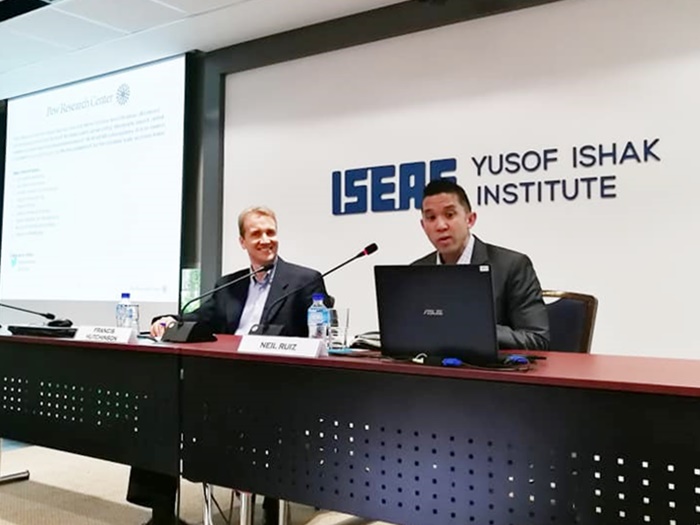In this seminar, Dr Neil Ruiz, Associate Director for Global Migration and Demography at the Pew Research Center, shared some of the key findings of a newly-released study on what the public in twenty-seven nations thinks about migration
REGIONAL ECONOMIC STUDIES PROGRAMME AND SINGAPORE APEC STUDY CENTRE
Tuesday, 16 April 2019 – After more than a decade of research on immigration in the United States, the Pew Research Center has intensified its exploration of global migration and demographic trends as well as international opinion regarding migration. In order to shed light on some of the key findings of a newly-released study on what the public in twenty-seven nations thinks about migration, the Regional Economic Studies Programme and the Singapore APEC Study Centre at ISEAS – Yusof Ishak Institute organised a seminar featuring Dr Neil Ruiz, Associate Director for Global Migration and Demography at the Pew Research Center, as the key speaker.
Following the introductory remarks by Dr Francis Hutchinson, Senior Fellow at ISEAS, Dr Ruiz began his presentation by talking about global immigration trends, highlighting that 258 million people lived outside their countries of birth in 2017. While India, Mexico, Russia, China and the Philippines were the largest origin countries, the top destination countries included the US, Saudi Arabia, Germany, UK and the UAE. Sharing recent statistics with the audience, he pointed out that since 2010, the fastest growth in emigrant populations were from Middle Eastern, North African and Sub-Saharan African countries.
 Dr Francis Hutchinson (left) gave the introduction before Dr Neil Ruiz begin his sharing on the key findings of the “2018 Global Attitudes Survey” (Credit: ISEAS – Yusof Ishak Institute)
Dr Francis Hutchinson (left) gave the introduction before Dr Neil Ruiz begin his sharing on the key findings of the “2018 Global Attitudes Survey” (Credit: ISEAS – Yusof Ishak Institute)
On the topic of attitudes towards migrants, Dr Ruiz focused on the findings of the “2018 Global Attitudes Survey” conducted by the Pew Research Centre. Based on a total of 27,612 interviews, the study showed that: there was widespread pessimism about children’s future in most of the surveyed countries; only a handful of countries were open to the idea of absorbing higher immigration; and the majority of interviewees in many European migrant destinations felt that immigrants increased the risk of terrorism.
Drawing the audience’s attention to some of the demographic trends in the US, the world’s largest destination country, Dr Ruiz mentioned that the immigrant share of the country’s population was soon going to approach its historic high, with immigrant population projected to increase from 45 million in 2015 to 78 million by 2065. While European immigrants were the most numerous in the US in the past, currently, Mexicans formed the largest group. Foreign student enrolment had contributed significantly to this trend; however, the numbers were starting to fall after the Trump administration came to power, Dr Ruiz concluded.

The audience asked questions on an array of topics including demographic dividend, ageing society, and recommendations for policymakers, during the Q&A. (Credit: ISEAS – Yusof Ishak Institute)
The ninety-minute seminar was attended by an audience of sixty-three people, including research scholars, students, members of the media and the public. Dr Ruiz answered their questions on an array of topics, including demographic dividend, ageing society, and recommendations for policymakers.


